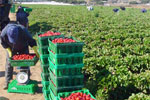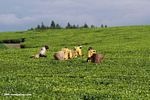Organic farming is more profitable and economically secure than conventional farming even over the long-term, according to a new study in Agronomy Journal. Using experimental farm plots, researchers with the University of Minnesota found that organic beat conventional even if organic price premiums (i.e. customers willing to pay more for organic) were to drop as much as 50 percent.
“Doing an economic study like this, it’s important to get as complete a picture of the yield variability as we can,” explains Timothy Delbridge, lead author of the study and a doctoral student studying agricultural economics at the University of Minnesota. “So, the length of this trial is a big asset. We’re pretty confident that the full extent of the yield variability came through in the results.”
Conducted over 18 years, the study found that a conventional farm, rotating corn, soy, oat, and alfalfa over 4 years brought in $273, while an organic farm netted $538. Even if the organic premium dropped by half, it would still be more profitable given that the cost of production was lower for organic, since organic farmers would spend nothing on chemicals.
“What we’re looking at here are results between an established organic and an established conventional system. This research doesn’t take into consideration the issue of the transition itself: how difficult or costly that may be,” cautions Delbridge.
Organic farming—which excludes the use of pesticides, herbicides, and GMOs—is considered better for environment, including less pollution, better use of water, and biodiversity-friendly practices. Findings vary, but studies have shown that organic farming is capable of producing similar yields to conventional farming. Organic farms also withstand natural disasters—such as droughts and hurricanes—better than conventional farming, which may be increasingly important in a world undergoing climate change.

Organic farm in Indonesian Borneo. Photo by: Rhett A. Butler.
Related articles
Growing strawberries organically yields more nutritious fruit and healthier soil

(11/08/2010) Strawberry plants grown on commercial organic farms yield higher-quality fruit and have healthier soil than those grown conventionally, according to a study published on 1 September in the journal PLoS One. The research suggests that sustainable farming practices can produce nutritious fruit, if farmers manage soil and its beneficial microbes properly. This is among the most comprehensive studies to investigate how conventional and organic farming methods affect both fruit and soil quality.
Could forest conservation payments undermine organic agriculture?
(09/07/2010) Forest carbon payment programs like the proposed reducing emissions from deforestation and degradation (REDD) mechanism could put pressure on wildlife-friendly farming techniques by increasing the need to intensify agricultural production, warns a paper published this June in Conservation Biology. The paper, written by Jaboury Ghazoul and Lian Pin Koh of ETH Zurich and myself in September 2009, posits that by increasing the opportunity cost of conversion of forest land for agriculture, REDD will potentially constrain the amount of land available to meet growing demand for food. Because organic agriculture and other biodiversity-friendly farming practices generally have lower yields than industrial agriculture, REDD will therefore encourage a shift toward from more productive forms of food production.
Sustainable farming is the only way to feed the planet going forward
(02/05/2009) Embracing more sustainable farming methods is the only way for the world’s farmers to grow enough food to meet the demands of a growing population and respond to climate change, the top crop expert with the United Nations Food and Agriculture Organization (FAO) said today.
